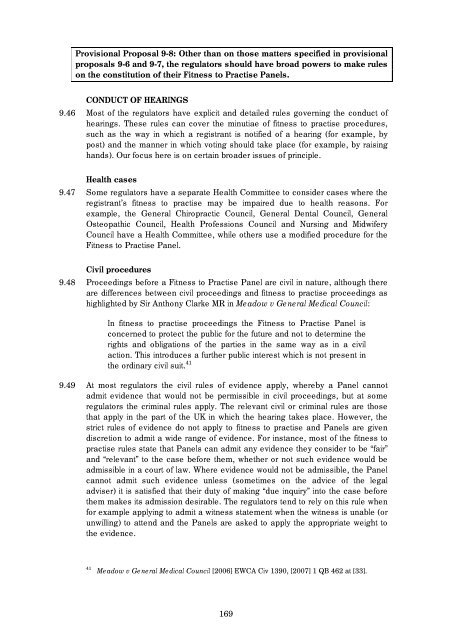Regulation of Health and Social Care Professionals Consultation
Regulation of Health and Social Care Professionals Consultation
Regulation of Health and Social Care Professionals Consultation
You also want an ePaper? Increase the reach of your titles
YUMPU automatically turns print PDFs into web optimized ePapers that Google loves.
Provisional Proposal 9-8: Other than on those matters specified in provisional<br />
proposals 9-6 <strong>and</strong> 9-7, the regulators should have broad powers to make rules<br />
on the constitution <strong>of</strong> their Fitness to Practise Panels.<br />
CONDUCT OF HEARINGS<br />
9.46 Most <strong>of</strong> the regulators have explicit <strong>and</strong> detailed rules governing the conduct <strong>of</strong><br />
hearings. These rules can cover the minutiae <strong>of</strong> fitness to practise procedures,<br />
such as the way in which a registrant is notified <strong>of</strong> a hearing (for example, by<br />
post) <strong>and</strong> the manner in which voting should take place (for example, by raising<br />
h<strong>and</strong>s). Our focus here is on certain broader issues <strong>of</strong> principle.<br />
<strong>Health</strong> cases<br />
9.47 Some regulators have a separate <strong>Health</strong> Committee to consider cases where the<br />
registrant’s fitness to practise may be impaired due to health reasons. For<br />
example, the General Chiropractic Council, General Dental Council, General<br />
Osteopathic Council, <strong>Health</strong> Pr<strong>of</strong>essions Council <strong>and</strong> Nursing <strong>and</strong> Midwifery<br />
Council have a <strong>Health</strong> Committee, while others use a modified procedure for the<br />
Fitness to Practise Panel.<br />
Civil procedures<br />
9.48 Proceedings before a Fitness to Practise Panel are civil in nature, although there<br />
are differences between civil proceedings <strong>and</strong> fitness to practise proceedings as<br />
highlighted by Sir Anthony Clarke MR in Meadow v General Medical Council:<br />
In fitness to practise proceedings the Fitness to Practise Panel is<br />
concerned to protect the public for the future <strong>and</strong> not to determine the<br />
rights <strong>and</strong> obligations <strong>of</strong> the parties in the same way as in a civil<br />
action. This introduces a further public interest which is not present in<br />
the ordinary civil suit. 41<br />
9.49 At most regulators the civil rules <strong>of</strong> evidence apply, whereby a Panel cannot<br />
admit evidence that would not be permissible in civil proceedings, but at some<br />
regulators the criminal rules apply. The relevant civil or criminal rules are those<br />
that apply in the part <strong>of</strong> the UK in which the hearing takes place. However, the<br />
strict rules <strong>of</strong> evidence do not apply to fitness to practise <strong>and</strong> Panels are given<br />
discretion to admit a wide range <strong>of</strong> evidence. For instance, most <strong>of</strong> the fitness to<br />
practise rules state that Panels can admit any evidence they consider to be “fair”<br />
<strong>and</strong> “relevant” to the case before them, whether or not such evidence would be<br />
admissible in a court <strong>of</strong> law. Where evidence would not be admissible, the Panel<br />
cannot admit such evidence unless (sometimes on the advice <strong>of</strong> the legal<br />
adviser) it is satisfied that their duty <strong>of</strong> making “due inquiry” into the case before<br />
them makes its admission desirable. The regulators tend to rely on this rule when<br />
for example applying to admit a witness statement when the witness is unable (or<br />
unwilling) to attend <strong>and</strong> the Panels are asked to apply the appropriate weight to<br />
the evidence.<br />
41 Meadow v General Medical Council [2006] EWCA Civ 1390, [2007] 1 QB 462 at [33].<br />
169
















